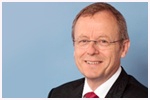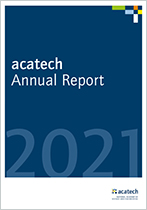
Munich Office – Karolinenplatz 4 / 80333 München, Germany
T. +49 (0)89/52 03 09-0
Identity

Jan WÖRNER
President

Thomas WEBER
President
Founding date: 2002
Number of members: 630
Number foreign members: 52
Management and Staff: 219 (2022)
Annual Budget: 23.296.000€ (2022)
Financing and sources:
Institutional funding • 16%
Project funding public funds • 63%
EU project funding • 15%
Project funding private funds • 6%
Mission
acatech – the National Academy of Science and Engineering has a mandate from the Federal Government and the Länder to contribute expert knowledge to the policymaking process. It provides effective structures for the science-based discussion of strategic technology issues. Experts from science, industry and civil society develop evidence-based proposals as input for the public and policy debate. The themes covered include technology policy issues relating to climate and environmental protection, Germany’s technological and digital sovereignty, sustainable mobility, health care and the life sciences as well as securing the supply of qualified specialists and technology communication.
Selected projects
Committees / Main working groups
The academy’s goals and working methods are determined by the scientific Members in the General Assembly. The members of the Senate advise the academy on strategic issues and play an especially important role in channelling proposals from industry. The academy’s Executive Board is proposed by the Board of Trustees and appointed by the General Assembly and Senate. The Executive Board is responsible for the academy’s management and for representing it externally.
More information: https://en.acatech.de/academy/
Working groups
– Biotechnology
– Circular Economy
– Digital and Self-learning
– Energy & resources
– Healthcare Technologies
– Innovation
– Mobility
– Security
– Technology & Society
– Work & Education
More information: https://en.acatech.de/topics/
Highlights 2020-2021
- In January 2020, the Third Innovation Dialogue took place with Chancellor Angela Merkel and her Ministers. At the event, Henning Kagermann, Chairman of the acatech Board of Trustees, together with representatives from industry and science, discussed the ‘Innovation Potential of Second Generation Quantum Technologies’.
- Within the framework of the National Platform for the Future of Mobility, the Steering Committee, chaired by Henning Kagermann, launched the project RealLabHH, a real-world laboratory in Hamburg exploring the digital mobility of the future.
- In December 2020, the National Platform Artificial Intelligence, co-chaired by the federal Minister of Education and Research Anja Karliczek and acatech President Karl-Heinz Streibich, published a progress report summarising the main results of the past years in key areas of AI research such as intelligent mobility, machine and deep learning, man-machine interaction, and AI and discrimination. It presents examples of practical applications in everyday life and also makes its own contribution to the innovation and socio-political AI discourse.
- In March 2021, Johann-Dietrich (Jan) Wörner was elected as one of acatech’s two Presidents, succeeding Dieter Spath. He is an engineer who has previously served as Director General of the European Space Agency (ESA), Chairman of the Executive Board of the German Aerospace Center (DLR) and President of the Technical University of Darmstadt.
- In May 2021, the “Circular Economy Roadmap for Germany” was officially handed over to the German Federal Ministry of Education and Research (BMBF). The roadmap is a framework for action that describes the necessary steps for Germany’s transition to a Circular Economy. With funding from the BMBF, the Circular Economy Initiative Deutschland was carried out under the guidance of acatech in cooperation with SYSTEMIQ.
- In late 2021, the acatech IMPULSE “5G in Industry” was published. It discusses the potential of 5G technology and possible barriers to its implementation and proposes a series of policy options for science, industry and government.





